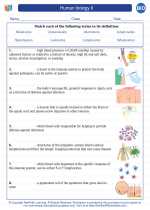Behavior
Behavior refers to the actions and reactions of an organism in response to internal and external stimuli. It is a crucial aspect of an organism's survival, reproduction, and interaction with its environment. The study of behavior encompasses a wide range of topics, including innate and learned behaviors, social behaviors, and behavioral adaptations.
Types of Behavior
1. Innate Behaviors: These are instinctive behaviors that are genetically programmed and are performed without prior experience. Examples include reflexes, mating rituals, and migration patterns.
2. Learned Behaviors: These are behaviors that are acquired through experience and interaction with the environment. Examples include problem-solving, social learning, and language acquisition.
3. Social Behaviors: These are behaviors exhibited by organisms in a group or social setting. Examples include communication, cooperation, and competition within a social group.
Factors Influencing Behavior
1. Genetic Factors: Genetic makeup plays a significant role in shaping an organism's behavior, influencing traits such as aggression, sociability, and susceptibility to certain behaviors.
2. Environmental Factors: The environment in which an organism lives can greatly influence its behavior. Factors such as food availability, temperature, and presence of predators can impact an organism's behavior.
3. Neurological Factors: The structure and function of an organism's nervous system can also influence its behavior. Neurotransmitters, hormones, and brain structure play a crucial role in regulating behavior.
Study Guide
To study behavior effectively, it is important to understand the following key concepts:
- Define behavior and its significance in the survival and adaptation of organisms.
- Compare and contrast innate and learned behaviors, providing examples of each.
- Explain the role of genetic, environmental, and neurological factors in shaping behavior.
- Discuss the concept of social behaviors and their importance in the functioning of social groups.
- Analyze specific examples of behavioral adaptations in different organisms and their impact on survival and reproduction.
Additionally, it is beneficial to explore case studies and real-life examples of behavior in different species to gain a deeper understanding of the complexities of behavioral patterns.
Understanding behavior is essential in comprehending the intricate interactions between organisms and their environment, as well as in addressing various ecological and conservation challenges.
[Behavior] Related Worksheets and Study Guides:
.◂Biology Worksheets and Study Guides High School. Human biology II

 Worksheet/Answer key
Worksheet/Answer key
 Worksheet/Answer key
Worksheet/Answer key
 Vocabulary/Answer key
Vocabulary/Answer key
 Vocabulary/Answer key
Vocabulary/Answer key
 Vocabulary/Answer key
Vocabulary/Answer key
 Vocabulary/Answer key
Vocabulary/Answer key
 Vocabulary/Answer key
Vocabulary/Answer key
 Vocabulary/Answer key
Vocabulary/Answer key
 Vocabulary/Answer key
Vocabulary/Answer key
